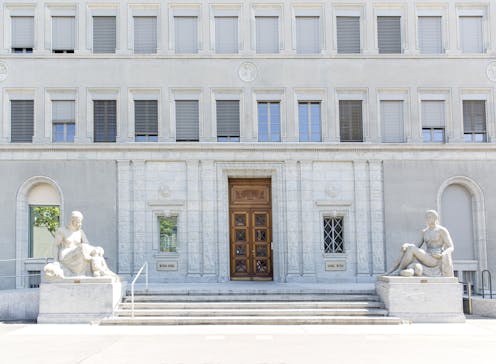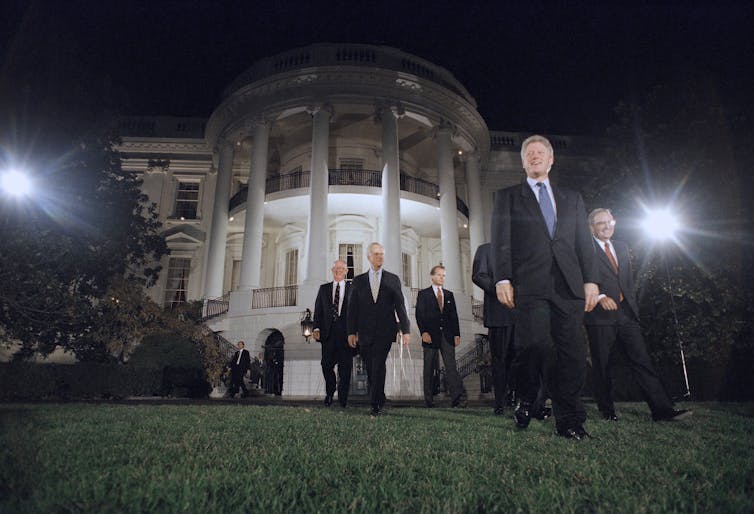America and the world still need the WTO to keep trade and the global economy humming
A quarter-century ago, more than 100 nations agreed to engage in freer trade with one another and signed the declaration that established the World Trade Organization.

President Donald Trump has made no secret of his disdain for the World Trade Organization.
Since taking office, the Trump administration has been blocking the appointment or reappointment of WTO judges – imperiling the essential work of its court in issuing trade rulings. The president has even threatened to leave the global body if it doesn’t “shape up.”
But what exactly is the WTO, why does it matter and should Americans care if the U.S. left it?
As an international trade scholar, I believe the WTO matters a great deal. To show why, I’d like to start with the history, which begins long before the agreement establishing the WTO was signed 25 years ago, on April 15, 1994.
History of the WTO
The Geneva-based WTO was the culmination of a 50-year effort spearheaded by successive U.S. governments to establish and secure a rules-based multilateral trade regime.
Before World War II, European powers imposed harsh trade restrictions against countries outside their empires, which hurt U.S. exporters substantially. This also contributed to Japan going to war to carve out an “East Asian Co-Prosperity Sphere” and Nazi Germany attacking eastward to obtain “living space” – that is, vassal territories – nearby.
The 1948 General Agreement on Tariffs and Trade, the WTO’s predecessor, was designed to avoid a repeat of the collapse of trade in the 1930s that worsened the Great Depression and to eliminate market access as a reason to go to war. But this agreement applied only to trade in goods, not services.
Efforts to forge a more comprehensive trade treaty didn’t succeed until the 1990s, following the so-called Uruguay Round of trade talks, which ultimately led to the creation of the WTO on Jan. 1, 1995.

A success story
The result has been spectacularly successful. Country exports as a share of global output surged from less than 5% in 1948 to over 30% today.
This enabled countries to grow faster and steadier and brought peace and prosperity to Europe and Japan.
Members of the WTO, which currently number 164, agree to four core principles:
Nondiscrimination, which means all imports are subject to the same tariff rate, with some exceptions;
Reciprocity, which balances the reduction of barriers and allows for retaliation;
Transparency;
Decision-making by consensus.
How it works
The WTO facilitates trade negotiations among member countries to open up markets and settle disputes that arise.
Subsequent rounds of negotiations have allowed countries to take big steps toward trade liberalization, while balancing concessions with benefits.
When disputes arise, such as the Trump steel tariffs, impartial panels adjudicate using WTO rules and permit injured countries to sanction violators. The U.S. ranks among the most frequent and successful users of this, which has helped keep markets open for American exporters.
What would happen if the U.S. left
If the U.S. were to leave the WTO, other countries could freely raise tariffs against it. And the U.S. would lose access to the dispute settlement mechanism, which would make retaliation the only response available.
This would inevitably raise prices and reduce choice for U.S. consumers, undercutting the competitiveness and profitability of companies that rely on imports and slow economic growth.
The WTO’s demise would also raise the odds of violent conflict among states because it would reduce opportunities for peaceful economic expansion.
I know the WTO is far from perfect. Its reliance on consensus decision-making at times hampers progress on pressing problems, and its dispute settlement process can be slow.
That said, the WTO remains one of today’s most valuable international organizations, and I believe the world would be poorer and less peaceful without it.
This is an updated version of an article originally published on July 3, 2018.
Stephen J. Silvia does not work for, consult, own shares in or receive funding from any company or organization that would benefit from this article, and has disclosed no relevant affiliations beyond their academic appointment.
Read These Next
Cuba’s speedboat shootout recalls long history of exile groups engaged in covert ops aimed at regime
From the 1960s onward, dissident Cubans in exile have sought to undermine the government in Havana −…
Drug company ads are easy to blame for misleading patients and raising costs, but research shows the
Officials and policymakers say direct-to-consumer drug advertising encourages patients to seek treatments…
Tiny recording backpacks reveal bats’ surprising hunting strategy
By listening in on their nightly hunts, scientists discovered that small, fringe-lipped bats are unexpectedly…





